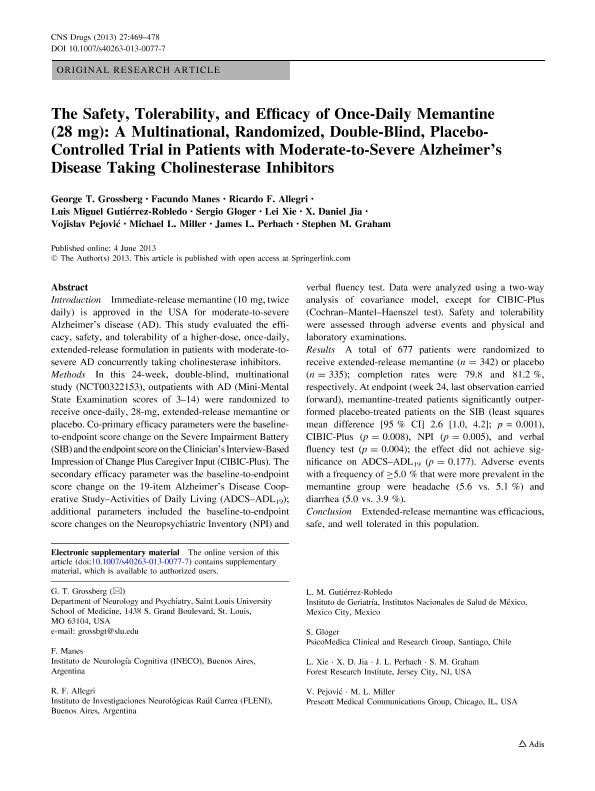Mostrar el registro sencillo del ítem
dc.contributor.author
Grossberg, George T.
dc.contributor.author
Manes, Facundo Francisco

dc.contributor.author
Allegri, Ricardo Francisco

dc.contributor.author
Gutiérrez Robledo, Luis Miguel
dc.contributor.author
Gloger, Sergio
dc.contributor.author
Xie, Lei
dc.contributor.author
Jia, X. Daniel
dc.contributor.author
Pejoviç, Vojislav
dc.contributor.author
Miller, Michel L.
dc.contributor.author
Perhach, James
dc.contributor.author
Graham, Stephen M.
dc.date.available
2017-09-20T19:01:47Z
dc.date.issued
2013-06
dc.identifier.citation
Grossberg, George T.; Manes, Facundo Francisco; Allegri, Ricardo Francisco; Gutiérrez Robledo, Luis Miguel; Gloger, Sergio; et al.; The safe, tolerability, and efficacy of once-daily memantine (28mg): a multinational, randomized, placebo-controlled trial in patients with moderate to severe Alzheimer's disease taking cholinesterase inhibitor; Springer; Cns Drugs; 27; 6; 6-2013; 469-478
dc.identifier.issn
1172-7047
dc.identifier.uri
http://hdl.handle.net/11336/24718
dc.description.abstract
INTRODUCTION: Immediate-release memantine (10 mg, twice daily) is approved in the USA for moderate-to-severe Alzheimer's disease (AD). This study evaluated the efficacy, safety, and tolerability of a higher-dose, once-daily, extended-release formulation in patients with moderate-to-severe AD concurrently taking cholinesterase inhibitors. METHODS: In this 24-week, double-blind, multinational study (NCT00322153), outpatients with AD (Mini-Mental State Examination scores of 3-14) were randomized to receive once-daily, 28-mg, extended-release memantine or placebo. Co-primary efficacy parameters were the baseline-to-endpoint score change on the Severe Impairment Battery (SIB) and the endpoint score on the Clinician's Interview-Based Impression of Change Plus Caregiver Input (CIBIC-Plus). The secondary efficacy parameter was the baseline-to-endpoint score change on the 19-item Alzheimer's Disease Cooperative Study-Activities of Daily Living (ADCS-ADL19); additional parameters included the baseline-to-endpoint score changes on the Neuropsychiatric Inventory (NPI) and verbal fluency test. Data were analyzed using a two-way analysis of covariance model, except for CIBIC-Plus (Cochran-Mantel-Haenszel test). Safety and tolerability were assessed through adverse events and physical and laboratory examinations. RESULTS: A total of 677 patients were randomized to receive extended-release memantine (n = 342) or placebo (n = 335); completion rates were 79.8 and 81.2 %, respectively. At endpoint (week 24, last observation carried forward), memantine-treated patients significantly outperformed placebo-treated patients on the SIB (least squares mean difference [95 % CI] 2.6 [1.0, 4.2]; p = 0.001), CIBIC-Plus (p = 0.008), NPI (p = 0.005), and verbal fluency test (p = 0.004); the effect did not achieve significance on ADCS-ADL19 (p = 0.177). Adverse events with a frequency of ≥5.0 % that were more prevalent in the memantine group were headache (5.6 vs. 5.1 %) and diarrhea (5.0 vs. 3.9 %). CONCLUSION: Extended-release memantine was efficacious, safe, and well tolerated in this population.
dc.format
application/pdf
dc.language.iso
eng
dc.publisher
Springer

dc.rights
info:eu-repo/semantics/openAccess
dc.rights.uri
https://creativecommons.org/licenses/by-nc-sa/2.5/ar/
dc.subject
Alzheimer
dc.subject
Memantine
dc.subject
Trial
dc.subject
Once-Daily
dc.subject.classification
Reumatología

dc.subject.classification
Medicina Clínica

dc.subject.classification
CIENCIAS MÉDICAS Y DE LA SALUD

dc.title
The safe, tolerability, and efficacy of once-daily memantine (28mg): a multinational, randomized, placebo-controlled trial in patients with moderate to severe Alzheimer's disease taking cholinesterase inhibitor
dc.type
info:eu-repo/semantics/article
dc.type
info:ar-repo/semantics/artículo
dc.type
info:eu-repo/semantics/publishedVersion
dc.date.updated
2017-09-19T14:25:43Z
dc.identifier.eissn
1179-1934
dc.journal.volume
27
dc.journal.number
6
dc.journal.pagination
469-478
dc.journal.pais
Alemania

dc.journal.ciudad
Berlín
dc.description.fil
Fil: Grossberg, George T.. Saint Louis University School of Medicine; Estados Unidos
dc.description.fil
Fil: Manes, Facundo Francisco. Instituto de Neurología Cognitiva; Argentina. Consejo Nacional de Investigaciones Científicas y Técnicas; Argentina
dc.description.fil
Fil: Allegri, Ricardo Francisco. Fundación para la Lucha Contra las Enfermedades Neurológicas de la Infancia. Instituto de Investigaciones Neurológicas "Raúl Carrea"; Argentina. Consejo Nacional de Investigaciones Científicas y Técnicas; Argentina
dc.description.fil
Fil: Gutiérrez Robledo, Luis Miguel. Institutos Nacionales de Salud de México. Instituto de Geriatría; México
dc.description.fil
Fil: Gloger, Sergio. PsicoMedica Clinical and Research Group; Chile
dc.description.fil
Fil: Xie, Lei. Forest Research Institute; Estados Unidos
dc.description.fil
Fil: Jia, X. Daniel. Forest Research Institute; Estados Unidos
dc.description.fil
Fil: Pejoviç, Vojislav. Prescott Medical Communications Group; Estados Unidos
dc.description.fil
Fil: Miller, Michel L.. Prescott Medical Communications Group; Estados Unidos
dc.description.fil
Fil: Perhach, James. Forest Research Institute; Estados Unidos
dc.description.fil
Fil: Graham, Stephen M.. Forest Research Institute; Estados Unidos
dc.journal.title
Cns Drugs

dc.relation.alternativeid
info:eu-repo/semantics/altIdentifier/url/https://link.springer.com/article/10.1007%2Fs40263-013-0077-7
dc.relation.alternativeid
info:eu-repo/semantics/altIdentifier/doi/http://dx.doi.org/10.1007/s40263-013-0077-7
dc.relation.alternativeid
info:eu-repo/semantics/altIdentifier/url/https://www.ncbi.nlm.nih.gov/pmc/articles/PMC3680656/
Archivos asociados
